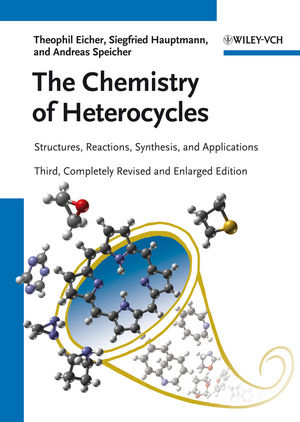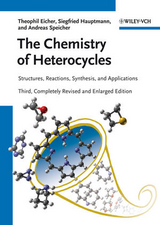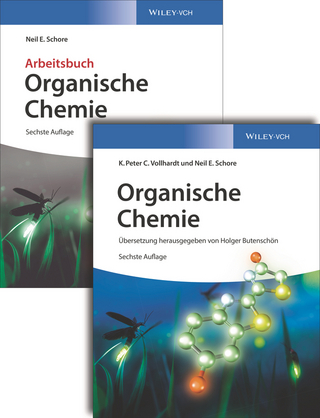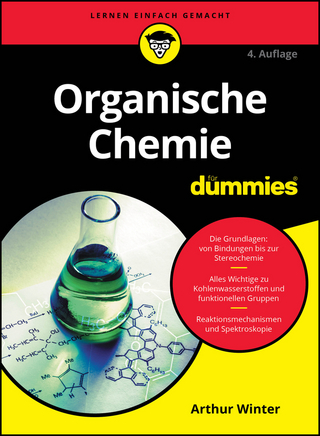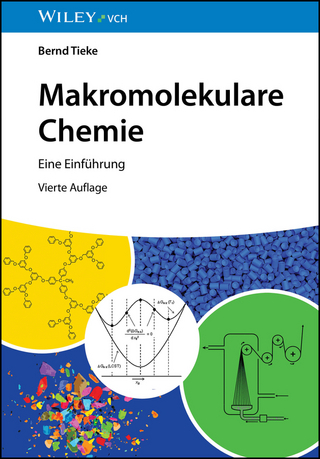The Chemistry of Heterocycles
Wiley-VCH (Verlag)
978-3-527-32868-0 (ISBN)
- Titel leider nicht mehr lieferbar
- Artikel merken
ordering system according to the ring size of the heterocycles has been retained, while the important chapter on 'Problems and their Solutions' has been almost completely renewed by introduction of up-to-date scientific exercises, resulting in a great tool for self-testing and exams. There was maintained a chapter on nomenclature and a helpful index of name reactions. With approximately 1,000 new literature citations, this book remains a brilliant gateway to modern heterocyclic science for master and graduate students, as well as PhDs and researchers entering the field.
'If you want quick information about the basic (or acidic!) properties of a heterocycle, some interesting facts, or an assorted few ways of making
it, this book provides a welcoming, accurate, and concise introduction.'
Angewandte Chemie IE
'Eicher and Hauptmann provide an up to date introduction to the field for the advanced undergraduate and graduate students. ... The book is carefully produced to a very high standard.'
European Journal of Medicinal Chemistry
Theophil Eicher studied chemistry at the University of Heidelberg and obtaind his PhD under Georg Wittig in 1960. After postdoctoral work at Columbia University, New York, in the laboratories of Ronald Breslow, he habilitated 1967 at the University of Würzburg under Siegfried Hünig. In 1974 he was appointed as Associate Professor at the University of Hamburg, in 1976 as Full Professor of Organic Chemistry at the University of Dortmund. Since 1982, he worked as Full Professor at the University of the Saarland, Saarbrücken, and was retired in 2000. Professor Eichers research interests concerned the synthetic chemistry of cyclopropenones and triafulvenes, as well as natural product synthesis in the field of bryophyte constituents. He is co-author of several books. Jointly with L. F. Tietze, he was awarded the literature prize of the 'Fonds der chemischen Industrie'. He is Dr. h. c. and Prof. a. h. of the Facultad de Quimica of the Universidad de la Republica, Montevideo/Uruguay. Siegfried Hauptmann studied chemistry at the University of Leipzig. In 1958, he obtained his PhD under Wilhelm Treibs, habilitated in the field of organic chemistry in 1961 and became Assistant Professor and later Full Professor at the University of Leipzig. He was retired in 1996. His research interests were centred predominantly to the fi eld of synthetic organic chemistry and reaction mechanisms. Professor Hauptmann was author and co-author of several books and deceased in April, 2011. Andreas Speicher studied chemistry at Saarland University, Saarbrücken. He obtained his PhD in 1994 under Theophil Eicher and was honoured with the Eduard-Martin-Award of his University. He started his independent scientific career and completed habilitation in 2003. He is head of a research group and university lecturer for organic chemistry at the Saarland University and was appointed extraordinary professor in 2011. He is temporary holding a guest professorship at the University of Strasbourg/France since 2006 and is co-author of several books. His research interests are directed to synthesis and characterization of chemically and biologically relevant natural products, especially to axially chiral macrocyclic compounds.
PREFACE TO THE THIRD EDITION
THE STRUCTURE OF HETEROCYCLIC COMPOUNDS
SYSTEMATIC NOMENCLATURE OF HETEROCYCLIC COMPOUNDS
Hantzsch-Widman Nomenclature
Replacement Nomenclature
Examples of Systematic Nomenclature
Important Heterocyclic Systems
THREE-MEMBERED HETEROCYCLES
Oxirane
Thiirane
2H-Azirine
Aziridine
Dioxirane
Oxaziridine
3H-Diazirine
Diaziridine
FOUR-MEMBERED HETEROCYLES
Oxetane
Thietane
Azete
Azetidine
1,2-Dioxetane
1,2-Dithiete
1,2-Dihydro-1,2-diazete
1,2-Diazetidine
FIVE-MEMBERED HETEROCYCLES
Furan
Benzo[b]furan
Isobenzofuran
Dibenzofuran
Tetrahydrofuran
Thiophene
Benzo[b]thiophene
Benzo[c]thiophene
2,5-Dihydrothiophene
Thiolane
Selenophene
Pyrrole
Indole
Carbazole
Isoindole
Indolizine
Pyrrolidine
Phosphole
1,3-Dioxolane
1,2-Dithiole
1,2-Dithiolane
1,3-Dithiole
1,3-Dithiolane
Oxazole
Benzoxazole
4,5-Dihydrooxazole
Isoxazole
4,5-Dihydroisoxazole
2,3-Dihydroisoxazole
Thiazole
Benzothiazole
Penam
Isothiazole
Imidazole
Benzimidazole
Imidazolidine
Pyrazole
Indazole
4,5-Dihydropyrazole
Pyrazolidine
1,2,3-, 1,2,4-, 1,3,4-Oxadiazole
1,2,5-Oxadiazole
1,2,3-Thiadiazole
1,2,4-Thiadiazole
1,2,3-Triazole
Benzotriazole
1,2,4-Triazole
Tetrazole
SIX-MEMBERED HETEROCYCLES
Pyrylium Ion
2H-Pyran
2H-Pyran-2-one
3,4-Dihydro-2H-pyran
Tetrahydropyran
2H-Chromene
2H-Chromen-2-one
1-Benzopyrylium Ion
4H-Pyran
4H-Pyran-4-one
4H-Chromene
4H-Chromen-4-one
Chroman
Pyridine
Pyridones
Quinoline
Isoquinoline
Quinolizinium Ion
Dibenzopyridines
Piperidine
Phosphabenzene
1,4-Dioxin, 1,4-Dithiin, 1,4-Oxathiin
1,4-Dioxane
Oxazines
Morpholine
1,3-Dioxane
1,3-Dithiane
Cepham
Pyridazine
Pyrimidine
Purine
Pyrazine
Piperazine
Pteridine
Benzodiazines
1,2,3-Triazine
1,2,4-Triazine
1,3,5-Triazine
1,2,4,5-Tetrazine
SEVEN-MEMBERED HETEROCYCLES
Oxepin
Thiepin
Azepine
Diazepines
LARGER RING HETEROCYCLES
Azocine
Heteronines and Larger-Membered Heterocycles
Tetrapyrroles
PROBLEMS AND THEIR SOLUTIONS
| Erscheint lt. Verlag | 18.10.2012 |
|---|---|
| Sprache | englisch |
| Maße | 170 x 240 mm |
| Gewicht | 1507 g |
| Themenwelt | Naturwissenschaften ► Chemie ► Organische Chemie |
| Schlagworte | Biochemie u. Chemische Biologie • Biochemistry (Chemical Biology) • Chemie • Chemistry • Food chemistry • Food Science & Technology • Food Science & Technology • Heterocyclen • Heterocyclische Verbindungen • Lebensmittelchemie • Lebensmittelforschung u. -technologie • Methods - Synthesis & Techniques • Methods - Synthesis & Techniques • Organische Chemie • Organische Chemie / Methoden, Synthesen, Verfahren • Pharmaceutical & Medicinal Chemistry • Pharmaceutical & Medicinal Chemistry • Pharmazeutische u. Medizinische Chemie |
| ISBN-10 | 3-527-32868-8 / 3527328688 |
| ISBN-13 | 978-3-527-32868-0 / 9783527328680 |
| Zustand | Neuware |
| Haben Sie eine Frage zum Produkt? |
aus dem Bereich
